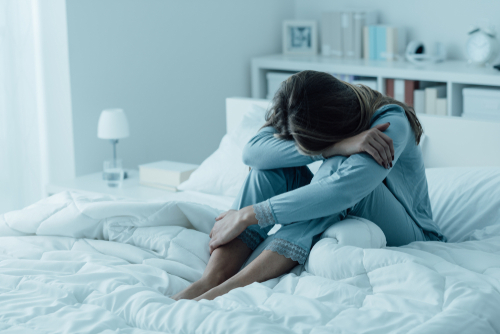Many people may use the word depressed when they’re describing times when they’re feeling sad, low or down, especially during challenging or stressful moments. However, it’s normal to feel down when you’re going through a difficult time.
Depression vs. Sadness: What’s the Difference?
Depression is much more than just feeling sad.
So, what is depression, then? Some people describe feeling depressed as though they are “living in a dark hole” or have a feeling of “impending doom”. Or, they feel lifeless, empty, and apathetic. Or some feel angry, aggressive, and restless.
Whatever symptoms you may experience, depression is different from normal sadness.
The Difference Between Sadness And Depression
The reality is that depression engulfs your day-to-day life in every way. It interferes with your self-care, ability to work, have fun, socialize and show up for your close relationships.
Unfortunately, depression leaves you feeling helpless, hopeless, and worthless with little to no hope of feeling that things will get better.
People who are experiencing depression struggle to live their everyday life in a healthy manner.
Often people who are depressed become love avoidant in their relationships. They feel it is too hard to simply “show up” therefore, they make their intimate relationships fall apart.
On the other hand, depression can also play a role in codependent behaviors in relationships, where individuals sacrifice their own needs for the sake of pleasing their partner, dealing with low self-esteem, fear, resentment, and a myriad of other painful emotions which may lead to depression.
What Are The Signs of Depression?
If you’re wondering if you or a loved one has depression, here are the most common depression signs and characteristics to look for:
Most Common Symptoms Of Depression:
- Disturbances to normal sleep patterns – either too little sleep or too much
- Loss of appetite or can’t stop eating – either one extreme or the other
- Finding it hard to concentrate and previously easy tasks now seem difficult
- Having difficulty remembering things
- Having feelings of worthlessness or guilt
- Having feelings of hopelessness or helplessness
- Finding it hard to control negative thoughts
- Feeling irritable, short-tempered, angry or more aggressive than usual
- Feeling down or ‘numb’ for longer than two weeks
- Losing interest in activities that you used to enjoy
- Negative self-talk
- Experiencing anxiety symptoms
- Loss of pleasure in activities
- Loss of sexual interest
- Problems with emotional intimacy
- Lack of energy, or feeling fatigued
- Experiencing thoughts of self-harm, suicide or that life is not worth living – if this is you, then you must seek immediate help
What Causes Depression?
There are several possible causes of depression.
Stressful or traumatic situations in life can trigger depression. Or it can be a reaction to a distressing situation like loss or stress (reactive depression).
Or depression can develop due to a combination of factors – life events or biological factors (genetics, hormones or an imbalance of certain chemicals in the brain).
Depression And Anxiety
If you have an anxiety disorder, you may also be feeling depressed. Although anxiety and depression can occur separately, it’s common for both to occur together.
Anxiety can be caused by clinical depression. Likewise, severe depression can be triggered by an anxiety disorder.
The good news… symptoms of both conditions can be managed with the same treatments: professional counseling, medication, and lifestyle changes.
What To Do If You Experience Depression?
If you think you are experiencing depression, the first step is to get diagnosed. Depression is a condition that can only be properly diagnosed by a licensed health professional.
Once you’ve been diagnosed, you can explore treatment options. For some individuals, lifestyle changes or joining community support groups may be enough to cope with the symptoms.
In moderate or severe cases, however, Individual therapy or medication can help to control the depression symptoms and help you lead a healthy life.
How Do You Fight Depression?
The good news is you’re not stuck with this forever. You can heal from depression and create a healthy relationship in the future.
Recovery starts with being aware of and recognizing the symptoms. It is about healing yourself and being committed to healing.
We recommend that you seek support from professionals. Remember, you are worthy of happiness, love and a healthy relationship.
Here’s How PIVOT Can Help
The Glass House offers intensive programs designed to help individuals suffering from depression through positive psychology, clearing the negative self-talk, understand what family of origin challenges could still be driving the depression, and improving day to day self-care.
Also, through our one-on-one coaching programs with a PIVOT Advocate, you will learn how to change unhealthy patterns that prevent you from living a happy life. We’re here to help.

